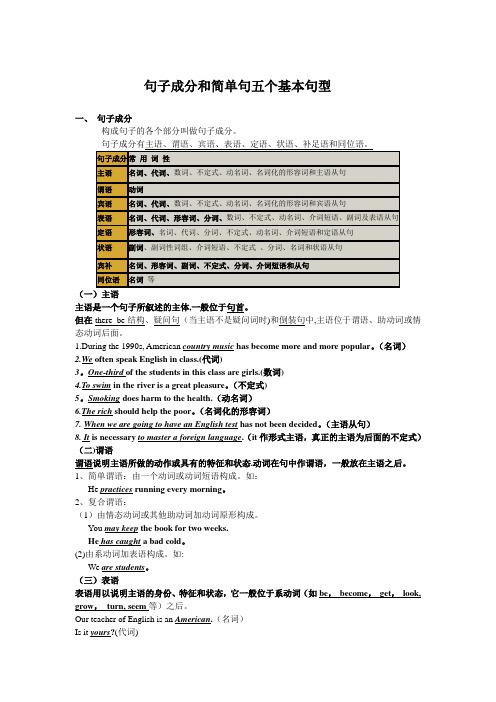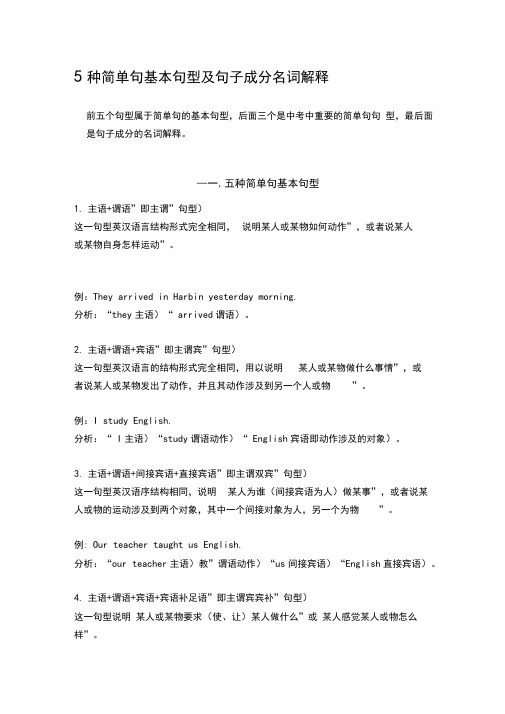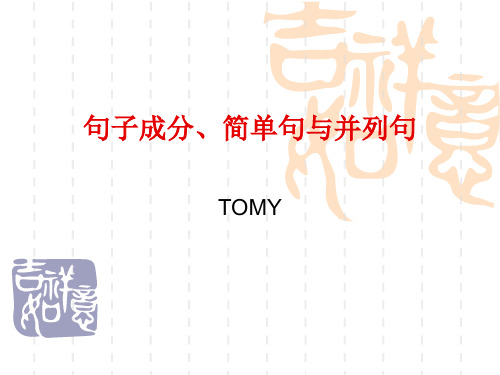简单句和句子成分
句子成分和简单句五个基本句型

句子成分和简单句五个基本句型一、句子成分构成句子的各个部分叫做句子成分。
(一)主语主语是一个句子所叙述的主体,一般位于句首。
但在there be结构、疑问句(当主语不是疑问词时)和倒装句中,主语位于谓语、助动词或情态动词后面。
1.During the 1990s, American country music has become more and more popular。
(名词)2.We often speak English in class.(代词)3。
One-third of the students in this class are girls.(数词)4.To swim in the river is a great pleasure。
(不定式)5。
Smoking does harm to the health.(动名词)6.The rich should help the poor。
(名词化的形容词)7. When we are going to have an English test has not been decided。
(主语从句)8. It is necessary to master a foreign language.(it作形式主语,真正的主语为后面的不定式)(二)谓语谓语说明主语所做的动作或具有的特征和状态.动词在句中作谓语,一般放在主语之后。
1、简单谓语:由一个动词或动词短语构成。
如:He practices running every morning。
2、复合谓语:(1)由情态动词或其他助动词加动词原形构成。
You may keep the book for two weeks.He has caught a bad cold。
(2)由系动词加表语构成。
如:We are students。
(三)表语表语用以说明主语的身份、特征和状态,它一般位于系动词(如be,become,get,look, grow,turn, seem等)之后。
5种简单句基本句型及句子成分名词解释

5种简单句基本句型及句子成分名词解释前五个句型属于简单句的基本句型,后面三个是中考中重要的简单句句型,最后面是句子成分的名词解释。
—一.五种简单句基本句型1.主语+谓语”即主谓”句型)这一句型英汉语言结构形式完全相同,说明某人或某物如何动作”,或者说某人或某物自身怎样运动”。
例:They arrived in Harbin yesterday morning.分析:“they主语)“ arrived谓语)。
2.主语+谓语+宾语”即主谓宾”句型)这一句型英汉语言的结构形式完全相同,用以说明某人或某物做什么事情”,或者说某人或某物发出了动作,并且其动作涉及到另一个人或物”。
例:I study English.分析:“ I主语)“study谓语动作)“ English宾语即动作涉及的对象)。
3.主语+谓语+间接宾语+直接宾语”即主谓双宾”句型)这一句型英汉语序结构相同,说明某人为谁(间接宾语为人)做某事”,或者说某人或物的运动涉及到两个对象,其中一个间接对象为人,另一个为物”。
例: Our teacher taught us English.分析:“our teacher主语)教”谓语动作)“us间接宾语)“English直接宾语)。
4.主语+谓语+宾语+宾语补足语”即主谓宾宾补”句型)这一句型说明某人或某物要求(使、让)某人做什么”或某人感觉某人或物怎么样”。
例:He asked her to go there.分析:“ he主语)asked谓语动作)“ her宾语即动作涉及的对象)“to go there 补”(语—补充说明宾语做什么)。
5.“主语+ 系动词+ 表语”即(“主系表”句型)这一句型用以说明“某人(某物、某事、某种概念)具有什么特征或处于什么状态”。
汉语的“是”字结构属于这一英语句型的形式之一。
常用的联系动词有be, keep ,lie, remain, stand, become, fall, get, go, grow, turn, look, feel, seem, smell, sound, taste, 等。
Lesson 1 句子成分、简单句与并列句

例1: They made the girl angry.(they是主语, made是及物动词, the girl是宾语, angry是宾补, 补充说明the girl怎么样了) 译:他们使这个女孩 生气了。
例2:They consider Jack a brave boy. (they是 主语, consider是及物动词,Jack是宾语, a brave boy名词短语,做宾补,补充说明Jack怎 么样)译:他们认为Jack是一个勇敢的男孩。
1.主语+连系动词+表语(主系表结构) ① 常见的连系动词有: 一.be动词:is, am, are及其过去式was, were
二.”保持”keep, stay 三. “变得”become, get, turn 四. “……起来”look, sound, smell, taste, feel
6、状语 修饰动词,形容词,副词以及全句的句子成分, 叫做状语。用作状语的通常是副词,表时间或 地点或程度的介词短语等。 ① I like travelling in spring. (介词短语修 饰动词travel) ② The man worked in the town three years ago. (时间介词短语和地点介词短语修 饰动词work) ③ I like football very much.
4、表语 表语是谓语的一部分,它位于系动词 如be之后,常有系表结构。
① You are handsome.你很帅哦~ ② The pig looks cool.这猪长得很酷… ③ Stay healthy! 保持身体健康!
5、定语 在句中修饰名词或代词的成分叫定语。 用作定语的主要是形容词,代词,名词,介词 短语等。 ① You are a brave boy. 你是勇敢的男孩 ② I wish everyone kind good luck. 我祝愿 好人好运 ③ The man under the tree is my father. 树 下的人是我老爸。 ④ The bike in the room is mine.房间里的自 行车是我的。
句子成分、简单句、并列句与复合句

一、句子成分 (一)句子成分的定义:构成句子的各 个部分叫做句子成分。句子成分有主要 成分和次要成分。 主要成分:主语和谓语。 次要成分:表语、宾语、定语、状语、 宾语补足语、+ 谓语 (S + vi.) An accident happened yesterday. S vi. 2、主语 + 系动词 + 表语 (S + V + P) 3、主语 + 谓语 + 单宾语 (S + vt. + O) 4、主语 + 谓语 + 间宾 + 直宾 (S + vt. + O + O) 5、主语 + 谓语 + 宾语 + 宾补 (S + vt. + O + OC)
3、 并列句的分类 1、表示连接两个同等概念,常用and, not only…but also…, neither… nor…, then等连接。 e.g. The teacher’s name is Smith, and the student’s name is John. 2、表示选择,常用的连词有or, either…or…, otherwise等。 e.g. Hurry up, or you’ll miss the train.
(2)主系表型(S+V+P) 句中的谓语由连系动词加上表语构成。此类简单 句主要反映事物的性质、特征或状态。
注意 系动词有三类,具体如下:
① 表状态: be, seem, appear( 显得 ) , go( 变成 ), stand(坐落),stay(保持), lie(位于), keep(保持) ②表感官: look(看上去), sound(听起来), smell(闻 起来), feel(感觉), taste(尝起来) ③表变化:get(变得),become(成为), turn(变成), grow(渐渐变成),come(成为)
句子成分句子结构

句子成分句子结构
句子成分是组成句子的各个部分,包括主语、谓语、宾语、表语、定语、状语等。
句子结构指的是句子的整体组织结构,包括简单句、复合句和并列句等。
句子成分主要有以下几种:
1.主语:句子中执行动作或被描述的主要名词或代词。
例句:Tom is a teacher.(Tom是主语)
2.谓语:句子中表示动作、状态或存在的动词或动词短语。
例句:She is reading a book.(is reading是谓语)
3.宾语:句子中接在动词后面,接受动作的名词或代词。
例句:I bought a new car.(a new car是宾语)
4.表语:句子中用来说明主语的名词、形容词、副词等。
例句:The food is delicious.(delicious是表语)
5.定语:句子中用来修饰名词或代词的词组或从句。
例句:The red dress is beautiful.(red是定语)
6.状语:句子中用来修饰动词、形容词、副词或全句的短语或从句。
例句:He runs fast.(fast是状语)
句子结构主要有以下几种:
1.简单句:只包含一个主语和一个谓语的句子。
例句:Mary likes ice cream.
2.复合句:包含一个主句和一个或多个从句的句子。
3.并列句:由两个或多个相互独立的简单句通过连词连接而成的句子。
例句:She likes to dance, and he likes to sing.。
英语句子成分及简单句分析讲解

三、表语 明确了系动词,表语就容易了。系动词后所给的就是表语, 但要注意be动词的使用,并非be动词所跟的都是表语,要注 意区分;be+V-ing构成进行时,be+V-ed构成被动语态;在 这两结构中的be动词没有实际意义;而做系动词使用的be动 词,表示“是”的意思,或者表示主语所处的状态。 判断这些句子的类型并理解be动词的用法(连系动词/助动 词) 1.The boy is asleep (_______________式) 2.The boy is sleeping. (_______________式) 3.The boy is playing the guitar. (_____________式) 4.He is playing happily. (____________式) 5.His music is very beautiful. (_______________式) 6.It is beautiful music. (_____________式)
双宾语(间接宾语+直接宾语),例如: Lend me your dictionary, please. bring sb. sth. = bring sth. to sb. 把某物带给某人 lend sb. sth. = lend sth. to sb. 把某物借给某人 offer sb. sth. = offer sth. to sb. 将某物给某人 pass sb. sth. = pass sth. to sb. 把某物递给某人 show sb. sth. = show sth. to sb. 拿某物给某人看 tell sb. sth. = tell sth. to sb. 告诉某人某情况
句子成分及简单句的五种形式

句子成分及简单句的五种形式简单句的五种形式:1.主语+谓语(vi)2.主语+谓语+宾语(vt)3.主语+系动词+表语系动词:(1) be(2) become get grow turn come go fall(3) look smell taste sound feel(4) remain hold keep stand stay(5) turn out prove(6) seem appear4.主语+谓语+宾语+宾语补足语(复合宾语)elect,feel,find get, have, hear, imagine, keep, make, notice, see, let, smell, start ,watch, appoint, believe, call, catch ,allow, ask, cause, consider, expect, know,tell, think, want, wish, listen to, look at5.主语+谓语+双宾语(间接宾语+直接宾语)give, bring, tell, send, leave, pass, read, write, take, wish, show ,teach ,get ,award, lend, rent, buy ,pay, hand, recommend句子成分1 主语( 动作的发出者,是一个句子的主体,必须用主格形式I you he she we they)He is a boy. The book is interesting.To find a good friend is difficult.Smoking is bad for your health.What is more important is how to get there.2 宾语(动作的承受着,放在及物动词的后边,必须用宾格形式me you him her us them)We often do homework at 6.I teach him English.I don’t know how to do it.We all believe he is honest.3 谓语(既是动词,表示具体的动作,分为及物动词和不及物动词)Later land animals appeared.The scene looks real.We can’t put up with the pollution.4 主语补足语既主补,用来补充说明主语,可以由名词形容词现在分词过去分词动词不定式介词副词等充当。
初中英语 五种简单句与六种句子成分

• 常跟双宾语的动词 • +to • bring, give, lend, offer, pass, send,
show, tell, write, ask等 • +for • buy, cook, draw, make, order等
Learning from practice
• 社区服务给做坏事的人一个机会。 • community • wrongdoers • Community services offer wrongdoers an opportunity.
定语
• 形容词作定语: • The little boy needs a blue pen. • 数词作定语相当于形容词: • There are two boys in the room. • 代词或名词所有格作定语: • His name is Tom. • 介词短语作定语: • The boy in blue is Tom. • 名词作定语: • There is only one ball pen in the pencil box.
宾语补足语:在宾语后面补充说明宾语的动作, 状态,特征.
• 1) Many hands make work light. • 2) They believe it of no value. • 3) The policemen do not allow anyone to enter. • 4) He found his money stolen. • 5) Education has made him what he is today.
D. was a strong influence on her work
Practice makes perfect
- 1、下载文档前请自行甄别文档内容的完整性,平台不提供额外的编辑、内容补充、找答案等附加服务。
- 2、"仅部分预览"的文档,不可在线预览部分如存在完整性等问题,可反馈申请退款(可完整预览的文档不适用该条件!)。
- 3、如文档侵犯您的权益,请联系客服反馈,我们会尽快为您处理(人工客服工作时间:9:00-18:30)。
简单句和句子成分一分析以下句子的句子成分They are standing on the playground. Fishing becomes popular.Jane finished her homework.句子的基本要素:主语+谓语主语一般由名词、代词、动名词和不定式充当。
谓语由动词或动词短语充当。
动词的词性不同,选用的句式也有所不同1.句型一:主语+谓语(vi)+(状语)1)She disappeared. 2)I live in Guangdong. 3)Hearing the good news, he jumped with joy. 不及物动词能表达完整的意思,后面可以跟副词、介词短语、状语从句等,谓语的修饰词叫状语, 可出现在句首或句末。
2. 句型二:主语+谓语(Link v.)+表语1)I am a student. 2) We are happy now 3) My job is teaching English.用以说明主语的特征、类属、状态、身份等。
系动词不能表达完整的意思,必须加上一个表明主语身份或状态的表语。
1表语一般跟在系动词后面;2表语一般由名词、代词、形容词、副词、动名词、不定式、分词或介词短语充当。
系动词包括以下三类(21 words):be动词“是”; seem 似乎,好像, appear 显得, 好像,似乎; feel 觉得感觉; look看起来;smell闻起来; taste尝起来;sound听起来;become 变得;get 变得; turn 变成; grow 逐渐变成;go 变得;fall 进入某种状态come 变成;stay保持;keep 保持; remain仍然是stand 处于某种状态;continue 继续存在句型三:主语+谓语(vt)+宾语1. 主语+谓语+名词或代词(n./pron)Many boys likes football very much.2. 主语+谓语+动名词I enjoy living in the country.3. 主语+谓语+不定式Mother promised to buy me a new computer.4. 主语+谓语+wh-+to do sth We haven’t dec ided where to hold the sports meet1.) 宾语跟在及物动词后面或介词后面2. )宾语由名词、代词、动名词、不定式或wh-+to do sth充当跟不定式作宾语的动词: vt+to doafford, agree同意, arrange(设法/约定), ask, beg(恳求,请求), choose, decide, demand(要求,请求), desire(想要), determine, expect, fail, hate, happen(碰巧), hesitate(踌躇), hope, intend, learn, manage(设法成功), mean(打算), offer, plan, prefer, prepare, pretend, promise, refuse, want, etc.跟动名词作宾语的动词: vt+doingadmit承认, advise建议,allow允许,appreciate感激,avoid避免,consider思考, deny否认, dislike不喜欢, enjoy喜欢, escape逃避, finish完成, forbid禁止,imagine想象,include包括, keep保持, mind介意,mention提及, miss错过,permit允许,practice练习, quit停止, resist经得住, suggest建议, feel like想要,判断以下句子使用哪种句型,并翻译为中文1. He looks tired.2. His words hurt me.3. She decides to stay here.4. The food tastes delicious.5. The book belongs to me.6. Hearing the news, her face turned red.7. She joined in all kinds of activities at university.8. To our delight, Doctor Zhang recovered from the disease.9. He reads the new words again and again in order to learn them by heart.1. 我不同意他的看法。
2. 他很快睡着了。
3. 三年前他患了肺癌。
4. 我在人群中认出她了。
5. 在比赛中,他总是保持冷静。
6. 他们最后解决了这个难题。
7. 许多人喜欢在他们日记里写下自己的感受。
8. 在他的人生中,他已经经历了许多苦难(hardship).1. _________(listen) to music can relax us.2. The time passed _______(quick).3. Mary can speak English _______(fluent).4. He often communicates ____ his e-pal on the Internet.5. The book seems ______(use) for your study.6. Mrs. Brown looks ________(health).7. I told her the news but she ignored ___. 8. John dislikes ________(play) football.9. I hope ________(teach) English. 10. I don’t know _____ to deal with the problem.二分析以下句子的句子成分He gave his sister a book.They made me happy.I will write you a letter.The doctor advised me to give up smoking.句型4:主语+谓语(vt)+间接宾语(人)+直接宾语(物)He brings me cookies every day. →He brings cookies to me every day.She bought me a beautiful skirt. →She bought a beautiful skirt for me.特点:谓语动词必须跟有两个宾语才能表达完整的意思。
这两个宾语一个是动作的直接承受者,另一个是动作的间接承受者。
但若要先说出直接宾语(事物),后说间接宾语(人),则要借助于介词to或for。
常跟双宾的动词(需借助to的)bring sb sth /bring sth to sb give sb sth / give sth to sb lend sb sth / lend sth to sbhand sb sth /hand sth to sb offer sb sth /offer sth to sb pass sb sth / pass sth to sbpay sb sth /pay sth to sb promise sb sth/promise sth to sb常跟双宾的动词(需借助for的)buy sb sth /buy sth for sb call sb for sth cook sb sth/cook sth for sbchoose sb sth/choose sth for sb draw sb sth/draw sth for sb find sb sth/find sth for sbget sb sth/get sth for sb make sb sth/make sth for sb order sb sth/order sth for sbsing sb sth/sing sth for sb save sb sth/ save sth for sb spare sb sth/spare sth for sb句型5:主语+谓语(vt)+宾语+宾语补足语We made him monitor. What he said made me very disappointedWe saw some children dancing in the garden.1. 主语+谓语+宾语+名词President appointed John manager of Marketing.2. 主语+谓语+宾语+形容词The news made me happy.3. 主语+谓语+宾语+副词I found him out when I arrived.4. 主语+谓语+宾语+介词短语I found my friend in the classroom.5. 主语+谓语+宾语+不定式/动词原形He encouraged her to work harder. The boss made him work overtime.6. 主语+谓语+宾语+现在分词/过去分词I saw him playing on the playground at that time. She had the clothes washed.2. 可以用作宾补的有:名词,形容词,副词,介词短语,动词不定式,分词等。
拓展句型: 主语+谓语+it+宾补+真实宾语主语+谓语+it+ 宾补(adj./n.)+ doing sth She thinks it no use practicing so much.主语+谓语+it+ 宾补(adj./n.)+ to do sth I found it very pleasant to be with your family.主语+谓语+it+ 宾补(adj./n.)+ that真实宾语从句He believed it impossible that she would agree. 1)能用于该句型的谓语动词有consider, believe, feel, find, make, think, suppose等;2)用doing作真实宾语时其宾补为no use, no good, useless, etc.判断以下句子使用哪种句型,并翻译为中文1. My grandma told me an interesting story.2. We made him monitor.3. He showed the conductor the ticket.4. I want you to paint the wall.5. My father bought me a new bike.6. I think it no use talking about this again.7. I will get the computer repaired. 8. I make it a rule to read English aloud in the morning. Exercises:1. Living in dorms can bring us great __________(happy)2. I am very grateful to Mr. Brown for offering ___ great help in America.3. The place we visited ________ (call) Diaolou.4. The news made me ________(anger).5. John persuaded me _______(buy) a bike finally.6. We found him ____(watch) TV when we came7. I think it interesting ________(cycle) along the bank.8. The officer commanded his soldiers _______(fire).9. The 15th National Book Fair made ___ convenient to buy books.10. The farmer is teaching the boy ____ to plant trees.Translations1. 我的妈妈给我带来了一些苹果。
